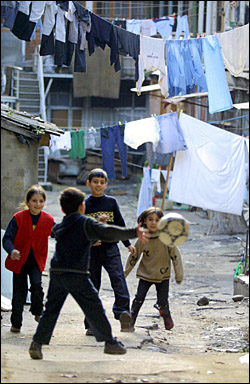Confronting Corruption
By Tim Whewell of BBC Current Affairs
Part 1, 2, 3, 4
 | Children playing in the streets of Tbilisi, Georgia.
VIKTOR DRACHEV/AFP/Getty Images |
In a tiny shabby room at the end of a long corridor, in a sleepy, almost forgotten provincial town, the plaster is peeling, the parquet floors creak, and outside, there are ramshackle old Soviet apartment blocks and the snow-covered peaks of the Caucasus Mountains.
A very old fashioned handset rings. Someone is ringing Gori 71874.
The call is taken by a young woman called Tea Sameya Tashvilli.
Here in Stalin's hometown, it's the start of a social revolution.
I ask her what the call was about.
"It was a call about the case when a lady who is trying to get a pension for her father who is disabled already for four years," says Tashvilli through a translator. "She cannot because she needs a document from a hospital saying her father is actually disabled. So the doctor demands 100 Lari to issue this document - as a bribe. Those people, they don't have 100 lari. Every day we received 30 to 50 calls from people whose rights were violated. Most of the cases are related to bribery and they call us, the new government and ask us to help them stop it."
This hotline, staffed by young volunteers, was set up here in the governor's office in Gori after the revolution that overthrew Eduard Shevardnadze, a revolution whose aim was to rid Georgia of corruption. Under the old regime, the state had become so rotten that it had almost ceased to exist. Everything was for sale. Since then, some of the highest officials have been led off in handcuffs to jail.
In Tbilisi, in the capital, there were incredible scenes where people stood in the main street day after day after day demanding the resignation of Shevardnadze's government. In the end, the man who became the president, the 36 year-old baby president as they call him, Mikhail Zha Kashvilli, he went, he walked with a rose into Parliament in the middle of a speech that Shevardnadze was making and he told Shevardnadze to get out. Everybody danced. What happened here in Gori?
"Yes, of course we danced," says Tashvilli. "We were shouting 'Misha, Misha.' Misha is the name of our president, right. And we were dancing, kissing each other. W e had these fireworks, and people were happy. Simply happy."
Since then, some of the highest officials have been led off in handcuffs to jail. But here in Gori, they understand that you can't clean up a whole country by chopping off a few heads. Everyone's got to fight corruption at every level, even in themselves.
Go to Part 2
|



